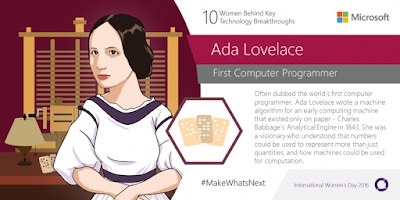 |
| Source: Microsoft blog. Ada Lovelace was the world's first computer programmer. |
Microsoft is calling on girls around the world to #MakeWhatsNext in celebration of International Women’s Day, a global celebration of women’s social, economic, cultural and political achievements.
Children are hardly taught about women in science, as a recent Microsoft video shows. The company asked girls to name female inventors – they couldn’t.
Interested?
There are 2016 DigiGirlz Days planned in Sydney, Australia, as well as in Beijing and Shanghai, China.
According to the World Economic Forum, the gender gap is not set to close until the year 2133 - a gender gap that is clear in computer science and science, technology, engineering and math education (STEM). And the Asian Development Bank says women in the region are on average 70% less likely than men to be in the labour force, notes Dr Daiana Beitler, Microsoft Philanthropies Lead, Asia, in a blog post.
Children are hardly taught about women in science, as a recent Microsoft video shows. The company asked girls to name female inventors – they couldn’t.
"On International Women’s Day, we want to put the spotlight on the leading ladies who have helped transform our world with technologies that we now find hard to live without. Their innovations and designs have more than shaped what defines a technology pioneer – they have become beacons for young girls all around the world to learn and draw inspiration from," Dr Beitler said in the blog post, which celebrates 10 women behind key technology breakthroughs.
Microsoft's efforts to encourage girls and women to change the world include the DigiGirlz campaign as well as the MakeWhatsNext hub, which spotlights girls and women who are already making what's next under the Microsoft YouthSpark initiative, and shares details about a Patent Program launched on March 7 that focuses on inviting select female inventors to receive support in patenting their ideas.
Interested?
There are 2016 DigiGirlz Days planned in Sydney, Australia, as well as in Beijing and Shanghai, China.
Hashtag: #MakeWhatsNext